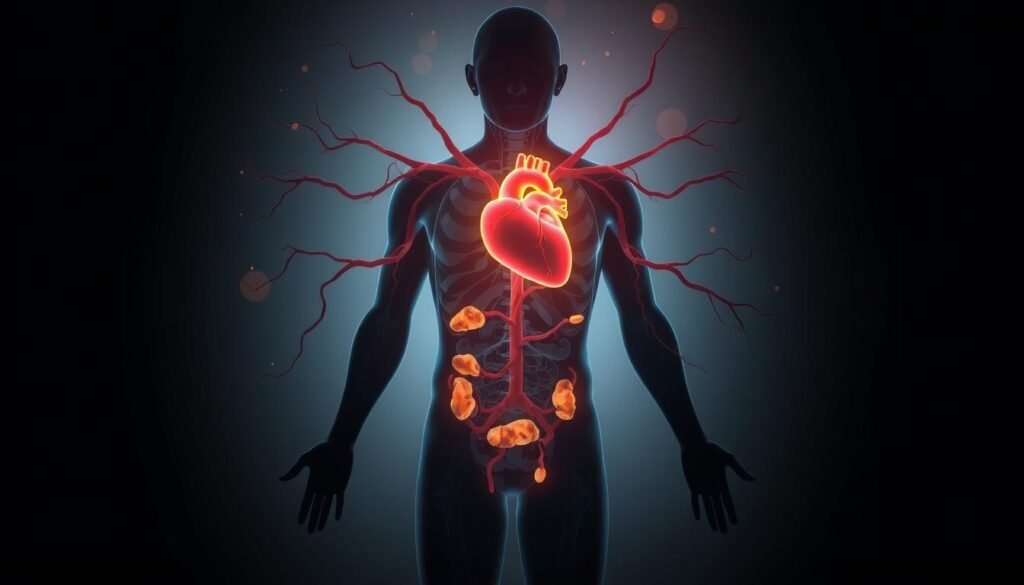About 38% of American adults have high cholesterol. It’s a big health issue, but not many link it to feeling tired. High cholesterol doesn’t often show clear signs. So, folks might not know they have it until it causes bigger problems. In the U.S., 1 in 250 people face familial hypercholesterolemia (FH). Yet, only 10% know they have it. It’s important to know how high cholesterol might affect your energy. This guide looks at if high cholesterol can make you feel tired, what symptoms to look out for, and tips to handle and avoid tiredness from too much cholesterol.
Key Takeaways
- High cholesterol is prevalent in about 38% of American adults.
- Familial hypercholesterolemia affects approximately 1 in 250 people in the U.S.
- Many people with FH remain unaware of their condition, posing serious health risks.
- Fatigue may be a recognized symptom but is often overlooked in the context of cholesterol levels.
- A simple blood test can diagnose high cholesterol and guide treatment options.
Understanding Cholesterol
Cholesterol is key for our health. It’s a waxy substance in our blood, important for building cells and making hormones. Our liver makes most of our cholesterol, but we also get some from food. Knowing about cholesterol helps us make better health choices, especially about heart health.
What is Cholesterol?
Cholesterol is crucial for our body. It keeps our brain and nerves working well. It also helps make vitamin D, hormones, and bile. But, too much cholesterol is bad. It can lead to health problems. Adults should check their cholesterol levels regularly. This is even more important for those over 40 or at heart disease risk.
Types of Cholesterol: LDL vs. HDL
Cholesterol comes in two main types: LDL and HDL. LDL is the “bad” one because it can clog arteries and lead to heart issues. HDL is the “good” cholesterol. It cleans up excess cholesterol from our blood. Knowing the difference between LDL and HDL is key for a healthy life.
Does High Cholesterol Cause Fatigue?
Exploring how cholesterol affects energy helps us understand fatigue better. High cholesterol itself might not make you tired directly. But, it plays a big role in creating conditions that make us feel drained.
Connection Between Cholesterol and Energy Levels
Cholesterol can cause fatigue by blocking blood flow. This happens when cholesterol piles up in arteries. This condition, called atherosclerosis, makes arteries narrow and cuts down circulation.
Less blood flow means muscles and organs get less oxygen and nutrients. This can make you feel tired even with little activity. So, if you’re feeling drained often, cholesterol might be a reason.
Fatigue as a Secondary Symptom
Fatigue often comes from issues related to bad cholesterol control. Conditions like heart disease and metabolic syndrome can make you feel more tired. These are linked to high cholesterol.
People with high cholesterol might feel tired all the time. They could also have shortness of breath or leg pain when moving. If you’re feeling this way, it could be a sign of heart or circulation problems.
High Cholesterol Symptoms
High cholesterol often shows no clear signs. It’s detected through blood tests. Yet, high cholesterol can cause health issues with noticeable symptoms. Spotting these helps manage heart health and well-being.
Common Symptoms Associated with High Cholesterol
Direct symptoms of high cholesterol are rare. But, as it increases, so does the risk of heart diseases. These conditions have symptoms like:
- Chest pain or pressure
- Shortness of breath
- Pain in the legs during physical activity
These signs suggest poorer blood flow due to high cholesterol. Acting on these signs early can stop bigger health issues.
Cholesterol-Related Tiredness Signs
Feeling tired for no clear reason can be a sign of high cholesterol. This can lead to being less active. It’s important to notice symptoms of this tiredness:
- Constant fatigue, even after sleeping well
- Struggling with daily tasks
- Feeling slow or sluggish overall
These symptoms might mean you have high cholesterol needing a doctor’s advice. Keeping cholesterol in check and a healthy lifestyle can help reduce fatigue.
How High Cholesterol Affects the Body
It’s crucial to know how high cholesterol impacts us. Especially for those at risk. High levels can cause big problems, like atherosclerosis. This condition leads to plaque build-up in arteries, which can slow or block blood flow. This poses big health risks.
The Role of Atherosclerosis
Atherosclerosis starts when cholesterol builds up on artery walls. This leads to inflammation and less blood flow. Plaque makes it hard for oxygen and nutrients to get to our organs. The heart and brain suffer most. Over time, this can cause issues such as:
- Chest pain or discomfort
- Leg pain while walking from poor circulation
- Feeling more tired and weak
- Getting winded easily during physical tasks
Complications of High Cholesterol
High cholesterol can lead to many health problems. These range from heart disease to strokes. It hits life quality hard. But it’s not just heart issues. It also causes:
- Constant tiredness, messing with daily life
- Brain fog, which impacts thinking and focus
- Weight gain, mostly around the middle

People facing chronic stress or bad lifestyle habits are more at risk. Regular checks and better habits are key. They help lower these risks and boost health.
| Cholesterol Level (mg/dL) | Status | Risk Factors |
|---|---|---|
| Below 200 | Normal | Low risk of heart disease |
| 200-239 | Borderline High | Potential risk, might need lifestyle tweaks |
| 240 and above | High | Higher risk of heart problems and stroke |
Cholesterol and Energy Levels
Unmanaged cholesterol impacts energy and physical activity significantly. It can lead to atherosclerosis when it builds up in arteries. This causes blood flow to be restricted.
Less blood circulation means less oxygen throughout the body. People might feel very tired, which makes daily activities hard. This creates a cycle of feeling too tired and not being active enough.
How Unmanaged Cholesterol Impacts Physical Activities
High cholesterol can make you feel very tired during exercise. It happens because blood vessels get narrow from plaque. So, the heart has to work more, making you feel out of energy.
Being overweight or not active makes this worse. High total cholesterol above 200 mg/dL and low HDL levels also lower your stamina. It might lead to choosing easier activities, which makes you feel even more tired.
Cholesterol Lethargy and its Effects
Cholesterol lethargy means feeling tired all the time. It gets in the way of normal life if cholesterol isn’t managed well. Even simple tasks can feel exhausting.
This can make staying healthy or being social very hard. Many people don’t see the link between cholesterol and how good they feel. Taking care of cholesterol can really improve life quality.
The Link Between Cholesterol and Fatigue Connection
Studies have shown a link between high cholesterol and feeling tired. This is especially true for people with high cholesterol who take statin drugs. This connection gives us insight into how cholesterol affects our energy and daily life.
Research Studies on Cholesterol-Induced Fatigue
In one study, 1,016 participants were observed, including 692 men and 324 nonprocreative women. They were given either 20 mg of simvastatin, 40 mg of pravastatin, or a placebo for six months. Their energy and fatigue levels were measured against their starting points.
Analysis found a clear link between initial fatigue levels and activity. Those on simvastatin saw a bigger drop in LDL cholesterol, which may affect energy. This group also felt more tired than those taking pravastatin or a placebo, pointing to a decrease in energy levels.
Interestingly, women felt more negative effects from statins on their energy and fatigue. This shows a difference in how cholesterol impacts well-being between men and women. Some noticed big changes in their energy, for better or worse, especially with statin use.
This research adds to what we know about cholesterol’s effects on energy and fatigue. It shows how high cholesterol and some medicines can make people feel tired. More studies are needed to fully understand this complex relationship.
| Medication | LDL Cholesterol Reduction | Effects on Energy Levels | Gender Differences |
|---|---|---|---|
| 20 mg Simvastatin | Higher reduction | Significant fatigue changes | More adverse effects in women |
| 40 mg Pravastatin | Lower reduction | Notable fatigue shifts | Consistent effects across genders |
| Placebo | No change | No significant changes in fatigue | Neutral effects |
When to See a Doctor
Knowing when to see a doctor is key to staying healthy, especially if you have high cholesterol. It’s important to spot the signs of high cholesterol early. Doing so can help you manage it better.
Recognizing the Signs
High cholesterol might not show clear signs, so staying alert about your health matters. You might feel unusually tired or find fatty bumps on your skin. Being overweight, having diabetes, or a family history of heart disease raises your risk. Regular blood tests are vital for spotting cholesterol problems. Knowing the signs of heart issues is key to keeping your heart healthy.
Importance of Regular Cholesterol Testing
Getting your cholesterol checked regularly is a must to avoid health problems. The CDC says adults should get tested every four to six years. If you’re at risk, you might need tests more often. Kids between 9–11 and teens between 17–21 should also get checked. This helps catch problems early. Knowing when to see a doctor about cholesterol can lead to healthier life choices or needed treatments.
| Cholesterol Testing Recommendations | Frequency |
|---|---|
| Adults (under 40, healthy) | Every 4–6 years |
| Adults (40 and older, with risk factors) | Annually or as recommended |
| Children (9-11 years) | Once recommended |
| Adolescents (17-21 years) | Once recommended |
Managing High Cholesterol Levels
To manage high cholesterol, start with dietary changes and add regular exercise. Making these lifestyle changes can lead to improvements.
Dietary Changes to Lower Cholesterol
Changing what you eat is key to lower cholesterol. Eat less saturated and trans fats to make a big difference. Here are important steps:
- Increase intake of fruits, vegetables, and whole grains.
- Opt for lean proteins such as chicken, turkey, and fish.
- Use healthy fats like olive oil instead of butter.
- Avoid processed foods high in sugars and unhealthy fats.
These actions lower LDL cholesterol, the bad kind linked to heart disease. To learn more about eating right to lower cholesterol, check out this guide.
The Role of Exercise in Reducing Fatigue
Being active is crucial for controlling high cholesterol and fighting fatigue. Regular exercise boosts the good HDL cholesterol. Good activities include:
- Engaging in at least 150 minutes of moderate aerobic exercise each week.
- Participating in strength training exercises on two or more days per week.
- Incorporating daily activities like walking, cycling, or swimming.
Exercise helps maintain healthy cholesterol levels and increases energy. Adding exercise to your daily schedule leads to better health and mood.

Effects of High Cholesterol on Overall Health
High cholesterol can seriously affect your health, leading to dangerous conditions. The effects of high cholesterol are more than just numbers on a test. They impact your daily life and future health. It’s very important to know the long-term health risks that come with high cholesterol.
Long-term Health Risks
What’s scary about high cholesterol is that it’s a silent problem. Many don’t know they have it until serious issues appear. Problems like strokes, heart attacks, and peripheral artery disease can be first signs. High LDL cholesterol can block arteries with plaque, raising the risk of these serious problems.
High cholesterol risk factors include lifestyle choices and genetics. Smoking, not exercising, and eating foods high in bad fats make things worse. If your family has a history of high cholesterol, you might be at risk too. That’s why regular checkups are so important for everyone, especially if high cholesterol runs in the family.
The following table outlines key health risks linked to untreated high cholesterol:
| Health Risk | Description |
|---|---|
| Heart Disease | High cholesterol contributes to the buildup of plaque in arteries, leading to heart disease. |
| Stroke | Blocked arteries can reduce blood flow to the brain, increasing stroke risk. |
| Peripheral Artery Disease | This condition results from narrowed arteries in the legs, causing pain and mobility issues. |
| Chest Pain (Angina) | The heart struggles to receive adequate blood flow, resulting in chest pain or discomfort. |
| Heart Attack | Severe artery blockage can lead to a heart attack, which is a life-threatening condition. |
Tackling high cholesterol is key to lowering the risks of these health issues. Making lifestyle changes, seeking medical help, and getting regular check-ups are crucial. They help manage and prevent the bad effects of high cholesterol on your health.
Preventing High Cholesterol and Associated Fatigue
Keeping cholesterol in check is key to good heart health and less fatigue. To improve heart health, making changes in how you live is crucial. These steps not only cut down the chance of high cholesterol. They also boost your overall health.
Lifestyle Changes for Optimal Cholesterol Levels
To better manage cholesterol, making some lifestyle changes is effective:
- Dietary Adjustments: Eating foods good for the heart is important. Cut down on bad fats to help lower cholesterol.
- Regular Exercise: Being active for 150 minutes a week is what the American Heart Association suggests. It keeps cholesterol levels in check and improves fitness.
- Stress Management: Using methods like meditation or yoga helps with heart health. Too much stress can lead to choices that bump up cholesterol.
- Avoiding Tobacco: Stopping smoking greatly reduces heart disease risk, linked to high cholesterol.
It’s also critical to keep up with doctor’s appointments. Checking your cholesterol often ensures it stays healthy. This helps stop problems like fatigue that comes with high cholesterol.

Conclusion
High cholesterol doesn’t instantly make you feel tired. But it can lead to health issues that lower your energy. The link between cholesterol and energy levels is complicated. Atherosclerosis makes arteries narrow and overworks the heart, causing fatigue. Also, bad diet and not exercising, common with high cholesterol, can make you feel tired too.
It’s key to manage high cholesterol for your health. Eating heart-healthy foods, exercising regularly, and maybe taking medications like statins help combat cholesterol fatigue. Always check your cholesterol levels with your doctor and adjust your treatments as needed.
Knowing how high cholesterol affects you can help improve your energy and lower health risks. For more on cholesterol’s effects on mental health, check recent studies. One good source is the National Institutes of Health.